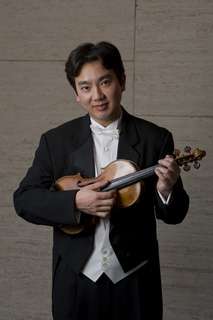|
Back
HSO Concertmaster Thrills with Tchaikovsky Houston
Jones Hall
11/01/2012 - and November 3, 4, 2012
Pyotr Ilyich Tchaikovsky: Violin Concerto in D Major, Op. 35 – Symphony No. 5 in E Minor, Op. 64
Frank Huang (violin)
Houston Symphony, Alexander Shelley (conductor) 
F. Huang (© Jeff Fitlow)
Hurricane Sandy's effects are being felt far and wide. While the re-conception of an orchestral concert more than a thousand miles away from the disaster area is rather trivial compared to the more immediate devastation felt in the northeast, it adds extra heft to the evening. Houstonians can certainly relate to the victims, and that empathy was amplified both by the moments of tumult and joy in the two Tchaikovsky works on the program.
Augustin Hadelich, the evening's planned soloist, was scheduled to play Bartók's fantastic Second Violin Concerto but, due to the complications brought to bear by Mother Nature, plans were changed. Frank Huang, the Houston Symphony's recently appointed concertmaster, stepped boldly up to the plate, agreeing at the last minute to complement Tchaikovsky's Fifth Symphony with the same composer's Violin Concerto. It is as thrilling a work as the Bartók, and was thrillingly performed. Huang projected confidence from the outset and was flashy and aggressive at all the right moments. His playing of the second movement was especially impressive, as listeners got to revel in his wonderfully sweet tone and intelligent, unobtrusive phrasing. The finale was taken at a Heifetz-esque clip, but this posed little challenge for Huang, who tossed of the most virtuosic of gestures as if they were child's play, exchange knowing glances and grins with the evening's acting concertmaster.
Alexander Shelley led with sensitivity, and there were many fine moments from the orchestra's soloists and sections. The Canzonetta's opening woodwind chorale was touching and wonderfully balanced, and when asked to match the soloist's virtuosity in the closing pages of the piece, the orchestra's string players easily met the challenge. As an audience, we were privy to a group of colleagues supporting one of their own, and doing so to the best of their ability. The reception granted Huang both by his fellow musicians on stage and by the small but appreciative audience was truly deserved.
Tchaikovsky's last three symphonies are orchestral meat and potatoes, and the HSO musicians clearly relished the Fifth, which flatters an orchestra of the HSO's caliber through and through. Clarinet, bassoon and horn solos deserve special mention for their excellence. Shelley coaxed the musicians into amplifying the menacing moments in the score, not only the obvious returns of the "fate" motive, but subtle coloristic effects such as the stopped horns in the third movement waltz. The brass delivered the expected radiance at the work's end, and were preceded by precise, scurrying strings that then laid a lush foundation of sound on which the triumph of the closing pages was built.
The interpretation saw Shelley exaggerating contrasts in the score, occasionally to the point of caricature. Some of these licenses, such as the persistent rubato in the second movement (literally compelled by Tchaikovsky's "con alcuna licenza" marking) and the thrillingly driven rush before the finale's coda, were convincing, but others were needlessly mannered. The most egregious was the sudden slamming on the brakes in the first movement's "Molto piů tranquillo" areas, which are actually marked only slightly slower than the main tempo of the movement. It is clear from this and Mr. Shelley's last visit to Jones Hall that he likes to push and pull the music like taffy, favoring exaggerated tempos and big, brassy sonorities. This approach was more convincing in tonight's Tchaikovsky outings than in the previous concert's Britten and Elgar fare. In both concerts, though, he cherry-picked moments from each work to highlight and make purposefully memorable, with the resultant loss of memorability for the entirety of the performance. The greatest conductors made their idiosyncrasies integral to their overview of a given piece. Shelley's draw needless attention to themselves, prompting unnecessary questions about the music.
Marcus Karl Maroney
|